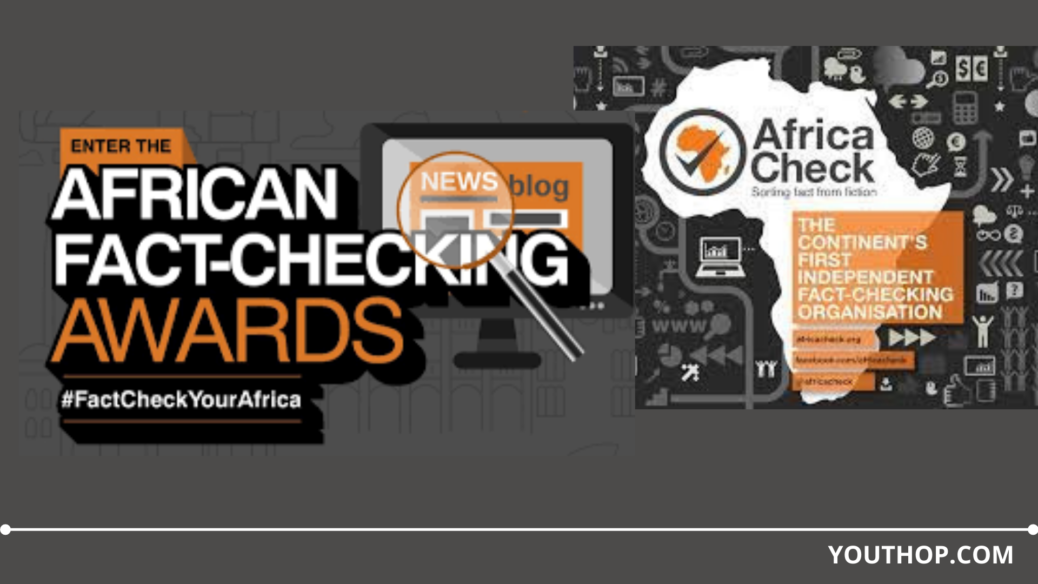Entries for the 2021 African Fact-Checking Awards, the longest-running awards programme that honours fact-checking journalism by the media in Africa, are now open!! Journalists and journalism students across the continent can enter the awards, now in their eighth year.
They received a record number of 192 entries from 27 African countries in 2020 and expect this number to rise again this year.
Looking for fully-funded opportunities, install the Youth Opportunities Android or iOS App here.
To qualify, the entry must be an original piece of fact-checking journalism first published or broadcast on any date from 23 August 2020 to 31 July 2021, by a media- or independent fact-checking organisation based in Africa. The work may be published in print or online, broadcast on the radio or television or published in a blog.
In the student category, the entry must be an original piece of fact-checking journalism first published or broadcast in a blog, student publication or by a media- or independent fact-checking organisation based in Africa.
Entries should expose a claim on an important topic that originated in or is relevant to Africa as misleading or wrong.
Facts matter. Every day across Africa, people make decisions, big and small. To do this, they rely on publicly available information. Often that information is misleading or just plain wrong. The baseless claims were shared in communities and believed by leaders of several states in the region, who then fomented a boycott of the vaccination campaign against polio. This led to a surge in cases.
The impact of this false information made it clear that Africa needed an organization dedicated to holding public figures accountable for what they said, and debunking dangerous false statements. Africa Check is the organization created for meeting this need.
Entries will be judged based on the following criteria:
Significance
The significance for wider society of the claim/statement investigated. How much does the topic matter to society at large and how serious could the consequences be if the claim wasn’t fact-checked?
Testing
How was the claim tested against the available evidence? Fact-checkers must take a long, hard look at the claim/statement that was made. Fact-checking entails rigorously sifting through the publicly available evidence for and against the claim. This should be done in a way that is fair to the person or institution who made the claim and strict in assessing the evidence.
Presentation
How well does the piece present the evidence for and against the claim? A good fact-checking report is structured in such a way that it’s understandable and makes the topic accessible to the widest possible public.
Impact
The impact that the fact-check had on public debate on the topic. Did it lead to a correction, did it have significant reach, or was it shared by other organisations or members of the media, for instance?
Africa Check gives Fact-Check of the year award in three categories:
- Fact-Check of the Year by a Working Journalist
- Fact-Check of the Year by a Student Journalist
- One runner-up in each of the two categories above
Location:
AfricaBenefits
- The winner of the working journalist category will get a prize of US$3,000,
- The runner-up will be awarded $1,500.
- The winner of the student journalist category will get a prize of $2,000, and the runner-up $1,000.
Eligibilities
- To qualify, the entry must be an original piece of fact-checking journalism first published or broadcast on any date from 23 August 2020 to 31 July 2021, by a media- or independent fact-checking organization based in Africa.
- The work may be published in print or online, broadcast on the radio or television or published in a blog.
- In the student category, the entry must be an original piece of fact-checking journalism first published or broadcast in a blog, student publication or by a media- or independent fact-checking organization based in Africa.
- Candidates can only enter for the awards in one category per year, but can submit more than one report if they choose.
- Students must have attended a journalism school at some period 23 August 2020 to 31 July 2021.
- Students must be younger than 35.
Application Process
- Follow the apply now link to submit the application form.
- Please follow the official link for further details.
Looking for fully-funded opportunities, install the Youth Opportunities Android or iOS App here.
Application Deadline: August 1, 2021
Application ClosedOfficial link









